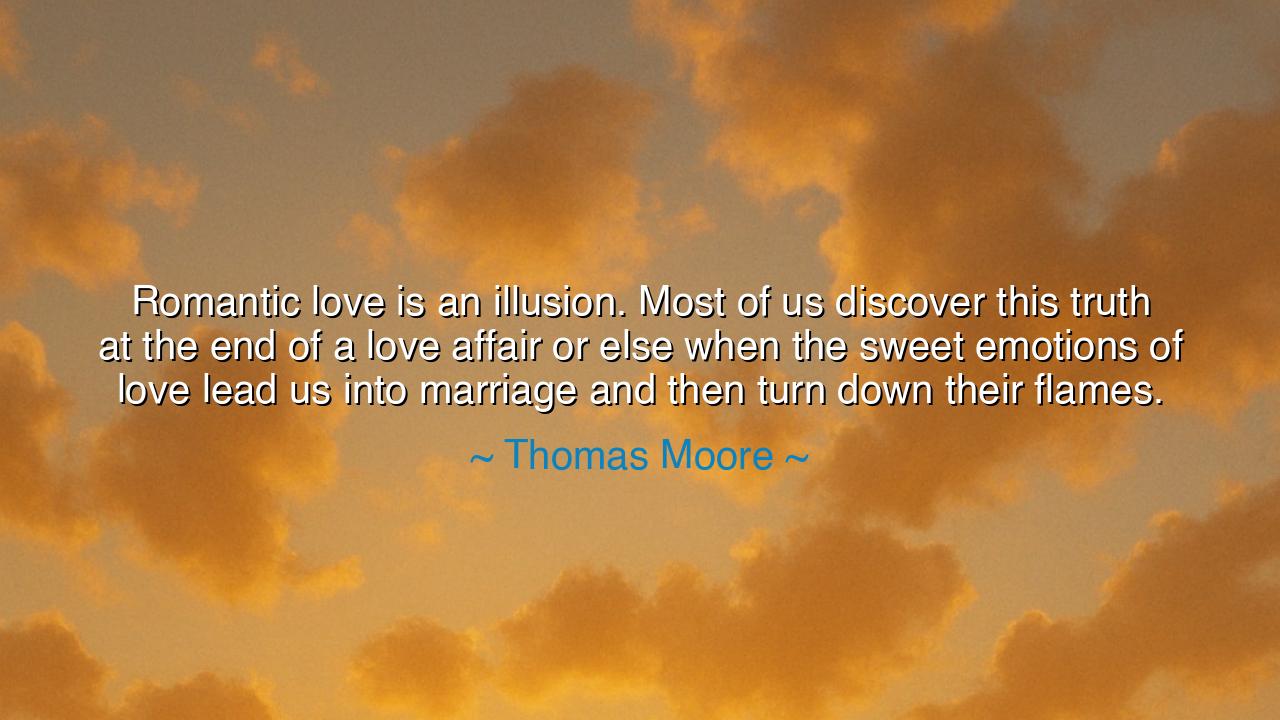
Romantic love is an illusion. Most of us discover this truth at
Romantic love is an illusion. Most of us discover this truth at the end of a love affair or else when the sweet emotions of love lead us into marriage and then turn down their flames.






The words of Thomas Moore — “Romantic love is an illusion. Most of us discover this truth at the end of a love affair or else when the sweet emotions of love lead us into marriage and then turn down their flames.” — ring with the melancholy wisdom of one who has looked deeply into the heart and found both its beauty and its frailty. Beneath the tenderness of his tone lies a truth that has echoed since the dawn of human passion: that romantic love, in its first radiance, is but a passing light — a dream spun by desire and idealization — and that only when the dream fades can true affection, steady and enduring, begin its work. Moore, the Irish poet and thinker of the early nineteenth century, wrote these words as both poet and philosopher, a man who had watched the fever of love cool into the quiet embers of reality.
In this reflection, Thomas Moore speaks not to destroy the sanctity of love, but to unveil its deeper nature. Romantic love, he says, is an illusion — not because it is false, but because it is incomplete. When lovers first meet, they see not one another’s true selves, but reflections of their own longing — the beauty, the perfection, the eternal joy they seek within themselves. These early flames, though glorious, are fragile. They burn brightly at first, lighting the heavens of youth and passion, but they consume what they touch. And when they fade, as all fires do, many mistake the cooling of emotion for the death of love itself. Yet Moore’s wisdom reminds us that this fading is not the end, but the unveiling — the moment when illusion gives way to truth, and the shallow passion of the senses can be transformed into the steady warmth of companionship and understanding.
The ancients spoke of love as having many faces. The Greeks, wise in the ways of the heart, distinguished between eros, the passionate, consuming fire; philia, the bond of friendship; and agape, the selfless love of soul for soul. Moore’s words echo this ancient wisdom: that eros, though intoxicating, is not the summit of love, but only its beginning. When the illusions of romance fall away, we stand before the naked truth — that to love another is not to worship a fantasy, but to embrace a flawed and mortal being, as frail and uncertain as ourselves. To reach this truth is not despair, but enlightenment. It is the crossing from dream to reality, from infatuation to devotion.
Consider the story of Napoleon Bonaparte and Josephine, whose love began with the fire of passion but ended in ashes of disillusionment. When Napoleon was young and rising in power, he wrote letters to Josephine filled with fevered devotion — words that trembled with longing and idealization. Yet when faced with the realities of marriage — ambition, distance, pride, and human imperfection — the dream dissolved. Their love, once thunderous, became hollow. Napoleon, the conqueror of nations, could not conquer the truth that Moore reveals: that romantic love built upon illusion must one day fade, and only those who learn to love beyond illusion find peace.
Yet not all stories end in such sorrow. There are those, like Elizabeth Barrett Browning and Robert Browning, whose love, though born in the fire of passion, grew into something vast and enduring. Their marriage was not without trial, but their love deepened as each saw the other more clearly — not as an ideal, but as a living soul. When the first flames turned to embers, they tended them with patience, forgiveness, and faith. In this they lived Moore’s deeper truth: that when romantic illusion dies, love can be reborn — not as a dream, but as a discipline of the heart.
Thomas Moore’s insight is not cynical, but compassionate. He does not mock romance; he honors it as a necessary illusion — the gateway through which many first pass to discover the soul’s deeper capacity for love. But he warns us not to mistake the gateway for the destination. When the sweetness of first love fades, we must not despair. The cooling of passion is not the death of love, but its transformation. Just as fire must yield to light, so must romance yield to wisdom. The true marriage, he says, is not between two bodies intoxicated by emotion, but between two spirits who, having seen each other’s shadows, still choose to walk side by side.
And so, my children, take this teaching to heart: do not fear when the first flames of passion wane. Let them wane, for what remains is purer. When you love, do not seek perfection — seek truth. Do not love to possess, but to understand. The one who can look upon their beloved in the quiet of ordinary days, without the thrill of illusion yet with the peace of devotion, has found what the poets called the “everlasting flame.” Tend that flame with kindness, patience, and humility.
Thus, the wisdom of Thomas Moore endures across centuries: romantic love is an illusion, but through its fading, we are invited to discover something greater — love not of fantasy, but of reality; not of fleeting rapture, but of enduring grace. For when the dream dissolves and the heart still chooses to stay, that is when love, real and eternal, begins its truest life.






AAdministratorAdministrator
Welcome, honored guests. Please leave a comment, we will respond soon